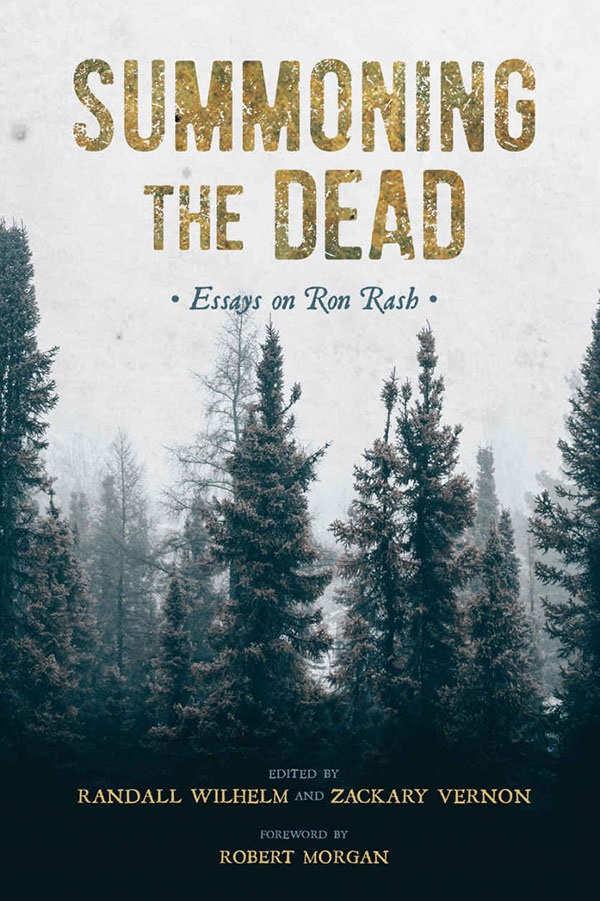Press release from Western Carolina University:
Ron Rash, best-selling author, poet and Western Carolina University’s Parris Distinguished Professor of Appalachian Cultural Studies, is the subject of a new collection of essays published by University of South Carolina Press.
In “Summoning the Dead: Essays on Ron Rash,” two of his WCU colleagues, Mae Claxton and Brian Railsback, are among the 17 writers who contrast, reflect and analyze his poems, short stories and novels. Described by the publishers as the first book-length collection of scholarship on Rash, the essays examine his work set in the southern highlands as increasingly relevant and important on regional, national and global levels in part because of both popularity and scholarly appeal.
“It is an honor to have a book devoted to my fiction and poetry, especially one that includes essays by Mae Miller Claxton and Brian Railsback, who are excellent scholars but also good friends,” said Rash, who is currently working on a book of short stories.
Claxton, a professor of English, looks at parallels with Eudora Welty, the one-time photographer and Pulitzer Prize-winning writer from Jackson, Mississippi, whose prominent use of place to frame images and imagery distinguishes her work. Claxton’s essay “Walking the Same Worn Path” highlights both authors use of class, racism, poverty and history’s impact on the present within their writing.
“I’m interested in how geography influences art,” Claxton said. “I wrote my dissertation on Eudora Welty’s photographs and the connection to place in fiction, so it was an easy jump to Ron’s works. My early study was what I would now call ‘Lower South’ literature — Faulkner, O’Connor, Welty. But since I teach Appalachian literature at WCU, I have become very interested in ‘Upper South’ or ‘Mountain South’ literature, so I’m reading more Wilma Dykeman, Horace Kephart, Emma Bell Miles and other writers from close by.”
Rash is author of the novels “Serena,” “Above the Waterfall,” “The Cove,” “One Foot in Eden,” “Saints at the River” and “The World Made Straight.” He has penned four collections of poetry and six collections of short stories.
“Another aspect is that we are accustomed to documenting Anglo-European influence on the Cherokee and other Native Americans, but I’m interested in exploring Cherokee influence on the early Scots-Irish settlers,” Claxton said. “And then there’s Ron’s Welsh and Celtic background, which adds another interesting piece to the unique cultural influences that can be found in Southern Appalachian literature.”
Railsback, a professor of English and author, offers up “The Single Effect of Ron Rash’s Environmental Vision,” an essay on Rash’s stylistic portrayal of Appalachia with the aid of natural settings and the people within.
“Ron has been very gracious and has allowed me to sit down and interview him, I believe, three times,” Railsback said. “I asked him questions that came from my reading of his work. As a Steinbeck scholar, it was wonderful to be able to ask those questions of a writer who is alive. I’ve had several conversations with Ron about the short story, and it seemed to me he was working at the same thing Poe tried to achieve: a short story or novel in which all the elements of fiction cohere in such a way… are so carefully crafted together, that the story has tremendous emotional impact on the reader.”
Rash is a Sherwood Anderson Prize recipient, twice winner of O. Henry awards, received an Appalachian Book of the Year award for “One Foot in Eden” and has been inducted into the South Carolina Academy of Authors. He won the prestigious Frank O’Connor Award in 2010 for “Burning Bright,” a collection of short stories.
Other contributors for “Summoning the Dead” include Jimmy Dean Smith, professor of English at Union College, with “Fierce Ghosts, Strange Shadows”; Zackary Vernon, assistant professor of English at Appalachian State University and co-editor of the collection, with “Strange Agrarianisms”; and Frederique Spill, associate professor of American literature at the University of Picardy-Jules Verne in Amiens, France, with “‘Like a dam broke open:’ Water and Narrative in ‘One Foot in Eden.’”




Before you comment
The comments section is here to provide a platform for civil dialogue on the issues we face together as a local community. Xpress is committed to offering this platform for all voices, but when the tone of the discussion gets nasty or strays off topic, we believe many people choose not to participate. Xpress editors are determined to moderate comments to ensure a constructive interchange is maintained. All comments judged not to be in keeping with the spirit of civil discourse will be removed and repeat violators will be banned. See here for our terms of service. Thank you for being part of this effort to promote respectful discussion.